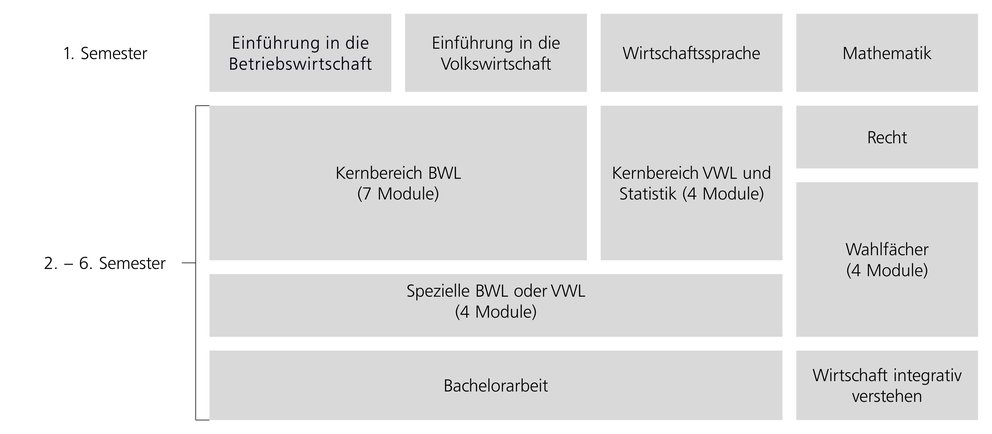Bachelor's Programme
Management and Economics
The programme is about the wide range of economic challenges and interrelationships which businesses, Non-Profit-Organizations, and economies on a local as well as a global level are faced with and which make it necessary to treat people and resources in a responsible way.
For further information please click here.
Study Programme
The Bachelor's Programme Management and Economics is aimed at all those who are interested in economic topics. It is the ideal basis for starting a career in a commercial profession or for a further master's degree.
The course provides a comprehensive basic knowledge of economic thinking and acting. Students learn what it means to manage a company and which tasks and challenges they face. They learn from numerous practical examples which management methods and tools companies and other organisations use today. In addition, they learn exciting backgrounds about markets and national economies in which individual companies are embedded.
During their studies, students can choose either Business Administration or Economics as their major focus and then set their personal focus from a wide range of electives (e.g. Corporate Management, Human Resource Management, Finance, Economic Policy or International Economic Relations). This allows each student to study economics according to his or her own interests.
Our studies offer space for independent work and reflective handling of acquired knowledge. Key competences such as teamwork, communication and presentation also play an important role.
Prospects for the future
"Versatility" is probably the best description of our graduates. Many of our former students have leading positions in companies in the private sector, in public administration or in non-profit organizations. The course also forms an excellent basis for a further master's degree.
5+1 Economics Plus!
We offer the option of supplementing our Bachelor's Programme in Management and Economics with other subjects. According to the 5 + 1 principle, you can supplement five semesters of Management and Economics content with one semester from another subject area. You simply replace the Management/Economic elective modules (30 ECTS) with a predefined module catalogue from another discipline.
Digital Science
The minor Digital Science, which was launched in the 2019/20 academic year, provides students with the opportunity to acquire valuable skills for a digitalised society. Here, you will learn the basics of data analysis and management using information technologies, gain insights into the world of programming, and understand how new technologies are transforming both the economy and society. With this vast toolbox of skills, you will stand out from the crowd and be well equipped for the job market of the future.
Learn more on the website of the Digital Science Center (DiSC): Minor Digital Science
Packages to choose from
- Sustainability
- Socienty and Politics
- Methods of Empirical Social Research
- Media and Communication Science
These packages complement the business and economics content with exciting insights from other subjects and help you to position yourself in an interdisciplinary way.
Content and Structure
Scope and Duration
The course is designed for a total of 180 ECTS-AP and 3 years of regular study.
The following table shows an exemplary course of the studyThe abbreviation 'ECTS-AP' stands for European Credit Transfer credits. An ECTS-AP corresponds to a study performance of 25 hours (attendance in the courses, preparation and follow-up as well as examination preparation). As a rule, 30 ECTS-APs are completed per semester.
Language
The programme is offered in German. However, students can also choose individual English-language courses.
Modules
The programme is organized in modules. In the initial phase, most modules consist of a lecture, which all students attend at the same time, and a proseminar, which is offered in parallel in small groups. In the further course of studies (SBWL, SVWL, electives) modules are generally held in small groups.
Course of studies
You can start your studies in the winter or summer semester. As a general rule, in the first semester you should complete the introductory and orientation phase (STEOP) with the modules "Introduction to Business Administration" and "Introduction to Economics". In addition, students normally attend the subject "Mathematics" and either the "Business Foreign Language" or "Law for Economics" in the first semester. This first semester forms the foundation for the further courses.
The following chart shows an overview of the modules completed during the course of studies:

- Core in Management: 4 modules on the basics of management (strategy and marketing, organisation and personnel, investment and financing, service processes), 2 modules on external and internal accounting, and one module on business informatics.
- Core in Economics and Statistics: 4 modules (theory of economic decisions, introduction to macroeconomics, economics of the public sector, statistical data analysis).
- Special Management or Economics: Altogether 4 basic and advanced modules in e.g. controlling, marketing, corporate management, taxation, business informatics, human resource management, etc. (management) or economic policy, international economic relations, market and state, behavioural and experimental economics, etc. (economics).
- Electives: 3 modules from the elective catalogue (e.g. Digital Business, Data Analytics, Operational Decisions, Gender and Diversity Management, etc.) as well as 1 "free" elective module from the entire offer of the University of Innsbruck.
- Supplementary package - Economics Plus! Instead of the optional subjects, a supplementary package from another field (e.g. digitisation, sustainability, political science, technology) can also be completed.
In the following you find an exemplary course of the studies:
1. Semester:
- 7,5 ECTS - Einführung in die Betriebswirtschaft
- 7,5 ECTS - Einführung in die Volkswirtschaft
- 7,5 ECTS - Wirtschaftsfremdsprache
- 7,5 ECTS - Mathematik
2. Semester:
- 7,5 ECTS - Rechnungswesen 1: Externes Rechnungswesen
- 5 ECTS - GdM: Management von Leistungsprozessen
- 5 ECTS - Makroökonomik
- 5 ECTS - Recht für Wirtschaftswissenschaften
- 7,5 ECTS - Statistische Datenanalyse
3. Semester:
- 7,5 ECTS - Rechnungswesen 2: Internes Rechnungswesen
- 5 ECTS - GdM: Organisation und Personal
- 5 ECTS - GdM: Investition und Finanzierung
- 7,5 ECTS - Wirtschaftsinformatik
- 5 ECTS - Theorie ökonomischer Entscheidungen
4. Semester:
- 5 ECTS - GdM: Strategie und Marketing
- 5 ECTS - Ökonomik des öffentlichen Sektors
- 7,5 ECTS - Freies Wahlfach
- 7,5 ECTS - SBWL Grundlagen/SVWL Grundlagen
- 7,5 ECTS - SBWL Grundlagen/SVWL Grundlagen
5. Semester
- 7,5 ECTS - Wahlfach
- 7,5 ECTS - Wahlfach
- 7,5 ECTS - SBWL Vertiefung/SVWL Vertiefung
- 7,5ECTS - SBWL Vertiefung/SVWL Vertiefung
6. Semester
- 7,5 ECTS - Wahlfach
- 5 ECTS - Wirtschaft integrativ verstehen
- 15 ECTS - Bachelorarbeit
Semester abroad
It is possible to spend a semester at a foreign university within the framework of the ERASMUS programme (or similar programmes). Further information can be found at the International Relations Center of the University of Innsbruck.
In VWL there are the following Specialisations:
- International Economics
- Verhaltens- und Experimentalökonomik
- Empirische Wirtschaftsforschung
- Markt und Staat
In VWL at the moment the following Electives can be chosen from:
- Migrationsökonomie
- Economics of European Integration
- Wirtschafts- und Sozialgeschichte
- Firms, Markets, Competition
- Freizeit- und Sportökonomik
- Gesundheitsökonomik und soziale Sicherung
- Machine Learning for Causal Analysis
- Data Analytics
- Digital Markets
- Regionalökonomik
- Internationale Währungs- und Finanzmarktpolitik
- Makroökonomik offener Volkswirtschaften
For a complete overview of all specializations and electives in economics at the University of Innsbruck, please click on the following link: Specializations and Elective Modules
Organisational Information
Location
Both faculties are located in the "Sowi" building, Universitätsstraße 15, 6020 Innsbruck. This is also where most of the courses take place. Some of the exams in the introductory phase of the studies take place in the Olympiaworld.
Introductory Information Event for New Students
TBA
Courses/Modules offered
The list of courses offered during the semester can be found on LFU:online. For the next winter semester, this information is generally published during the summer months.
Registration for the Modules in the Fiirst Semester
The registration for the modules takes place online before the beginning of the semester. The information event for new students will explain how registration works and how it is carried out on site.
First Semster Tutorials for Economics and Statistics and IWW
Information on the ÖH tutorials can be found here.
Admission
The prerequisite for admission to the programme is the successful completion of a Matura (A-level) or equivalent qualification.
For prospective students who have not completed a Matura or equivalent qualification, an academic entrance qualification can be obtained by passing the University Entrance Qualification Examination. This provides the necessary knowledge for admission to studies in a particular field of study group. The university entrance qualification examination can only be taken for studies offered at the University of Innsbruck in the respective field of study.
Registration for studies is online.
Further information regarding admission to a course of study can be found on the homepage of the study department of the University of Innsbruck.
Frequently Asked Questions
Entrance Examination and Course of Studies
Can I enrol directly or is there an entrance test? ↓
There are no admission tests. Please contact the study department directly, online or in person, and then enrol by the beginning of September for the winter semester and by the beginning of February for the summer semester.
Is there an introductory event? ↓
Yes, an introductory information event will take place at the end of September. Further information will be published on this website in advance.
Do I always have to achieve the 30 ECTS-AP per semester and what happens if I don't manage it? ↓
How quickly you study is up to you. We make sure that you can achieve 30 ECTS-APs. However, we also know that many students work while they are studying and the pace of their studies therefore varies.
Can I schedule my studies flexibly so that I can also work on the side? ↓
Since we offer several parallel courses in small groups in most modules, you have a certain flexibility in terms of time during your studies. In addition, the course times also vary between the winter and summer semesters.
I have studied somewhere else before. Can I use this somehow? ↓
Yes, we look at all the academic achievements of other universities individually and decide whether these achievements are creditable. In this case, please contact the study officer (see below).
Funding
Are there scholarships for studying? ↓
The Austrian state offers scholarships. Further information can be found at www.stipendium.at. For the Bachelor's Programme it is also possible to get a performance-based scholarship, which is awarded by the University of Innsbruck. Further information on the homepage of the Central Department of studies of the University of Innsbruck.
Are there tuition fees?
Currently, there are no tuition fees for EU citizens in Austria for a university course of study within the standard duration of study. Only a small contribution (approx. 20 Euro per semester) is to be paid to support the Austrian Student Union (ÖH).
Kontakt
Dean of Studies at the Faculty of Economics and Statistics:
Univ.-Prof. Dr. Janette Walde
DeanStudies-EconStat@uibk.ac.at
Dean of Studies at the Faculty of Business and Mangagement:
Univ.-Prof. Dr. Mike Peters
dean-studies-management@uibk.ac.at
Programme Manager:
Ass.-Prof. Mag. Dr. Claudia Müller

